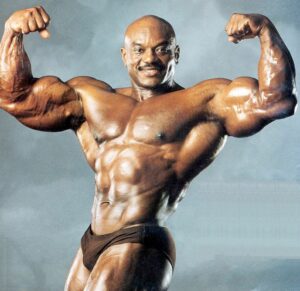“He was so huge. He was so fantastic. There was no way I could even think of beating him. But I’d been so taken back by my first sight of Sergio Oliva that I think I settled for second place before we walked out on the stage… I never like to admit defeat, but I thought Sergio was better.” Cuban native Sergio Oliva defeated Arnold on stage and won the Mr. Olympia three times, but his greatness wasn’t without hardship.
Chet Yorton, Frank Zane, and Sergio Oliva. They are the few men to have beat legendary seven-time Mr. Olypia winner Arnold Schwarzenegger in competition. When Oliva bested Arnold at the 1969 Mr. Olympia, the only Olympia Arnold lost, the “Austrian Oak” learned the importance of mystique. Backstage, Oliva pumped up in a large butcher’s coat, which hid his muscularity from competitors. Before going on-stage, “The Myth” removed the coat to reveal size none could rival. The result was jaw-dropping and, as Arnold wrote in his book Arnold: The Education of a Bodybuilder, discouraging.
Sergio Oliva was one of the greatest bodybuilders of the 20th century. He pushed fan’s expectations of bodybuilding, helped make the Mr. Olympia the sports’ biggest contest, and was considered by many to possess the first truly mythical physique.
Coming to America
Oliva was not born in the United States, although he did solidify his fame there. He was born in Cuba in 1941 and grew up during the Fulgencio Batista dictatorship. In 1959, Fidel Castro became the Cuban prime minister. Around the same time, Oliva gained an interest in muscle-building. In a moment of serendipity, Oliva was invited to join a local weightlifting club when a passerby saw him relaxing at the beach. Even in an untrained state, it was clear that soon-to-be Mr. Olympia had great genetics. (2)
Training as a middle-heavyweight, Oliva boasted a 300-pound clean & jerk after six months in the gym. Eventually, he was capable of a 1,000-pound total in the Olympic lifts (which at that time were the clean & jerk, the snatch, and the press). Oliva was so proficient that he was part of the 1962 Cuban weightlifting team, which competed in the Central American and Caribbean Games in Kingston, Jamaica, at a weight of 90 kilograms. (3)
It was at the Games that Oliva’s story began to resemble a Hollywood movie. Competing at the Games, where he won a silver medal, Oliva defected to the United States. According to later reports, he escaped his Cuban handlers and physically ran to the American consulate where he sought political asylum. (4)
From Weightlifting to Bodybuilding
The Cuban emigre community in the United States has grown from 79,000 people in 1960 to 439,000 in 1970. (5) Like many of his countrymen and women, Oliva first arrived in Miami, where he worked for a short period as a TV repairman. In between work, he continued to train as a weightlifter.
Cuban migration in America during this period took a variety of forms. Some immigrants stayed in Florida, specifically Miami, whereas others eventually moved to other states. Oliva fell into the latter category. In 1963 he moved to Chicago after some close friends encouraged him to make the move.
Oliva picked up work in a local steel mill in Chicago before joining the police force (where he stayed for 25 years). In Chicago, Oliva became a member of the Duncan YMCA — better known by bodybuilding aficionados as the “The Midwest Mecca of Muscle.” It was a hotspot for bodybuilders and weightlifters. (6)
Check Out Our List Of The Best Supplements For Building Muscle, Shredding Muscle, Recovery, And Great Health, and Wellness Products! Purchase ifbnewsfeed.org‘s apparels Here: ifbnewsfeed.org
- Hormone Replacement Therapy regimen For Men and women
- Hormone Blood Testing for Men (Bodybuilder Blood Testing)
- Shop Optimum Nutrition Energy: Anytime & Pre-Workout
Its alumni include Sergio Oliva, Bob Gadja, and, briefly, Arnold Schwarzenegger. The workouts were legendary, as was the camaraderie between trainees. As bodybuilding trainer Randy Roach previously explained, the Duncan was well known in the strength community. It came to have a profound impact on Oliva’s own career and the sport of bodybuilding. (7)
Bob Gajda, the eventual 1966 AAU (Amateur Athletic Union) Mr. America winner, befriended Oliva at the Duncan. The two men became training partners. It was with the help of Gadja and the Duncan’s regulars that Oliva switched from weightlifting to bodybuilding. (8)
In 1963 Oliva entered and won his first bodybuilding show, the Mr. Chicagoland. The next year, he won a Mr. Illinois contest and finished seventh in the Mr. America contest (Vern Weaver won that year). (9)
Winning the Mr. America was the pinnacle for American bodybuilders, but, as Oliva quickly learned, the contest was wrought with problems. Seeking to find the best representative of American masculinity, the contest judged competitors based on their physique, personality, and their athleticism.
This caused problems when the most muscular competitor didn’t win the show due to his personality or athleticism. This is exactly what happened to Oliva in 1965 when he won the “Most Muscular Award” but still finished in second place. (10) Oliva alleged racism on the part of the judges, and later evidence in part supported his accusation.
One judge claimed that Oliva had “the outstanding physique of the meet” but “had he been a citizen and speak English fluently. He probably could have won the Mr. America title.” (11)
When Oliva finished second the following year, he didn’t hold back. He told reporters: “The AAU guys who don’t know the Civil War is over say Gajda is the winner when everyone in the house knew it was me.” (12) Luckily for Oliva, the Mr. America contest was, by that time, no longer the only bodybuilding contest in America.
In 1965 Ben and Joe Weider founded the Mr. Olympia contest, which, they promised, would judge contestants solely based on their physique and nothing more. It was at the Olympia that Oliva’s reputation as “The Myth” was born.
Oliva’s Olympia Years
Months after his second-place Mr. America finish, Oliva entered, and won, the Mr. World contest, run by the Weider’s IFBB (International Federation of Bodybuilding and Fitness). Comfortable with the IFBB’s focus on the body above all else, he also entered that year’s, Mr. Olympia. Unfortunately for Oliva, the 1966 Olympia belonged to one man — Larry Scott.
Despite Oliva’s large physique, he still lacked the conditioning Scott brought to the stage. Scott won his second Mr. Olympia (he won the inaugural Mr. O in 1965). Oliva finished fourth. (13) Undeterred, Oliva returned a second year where, following Scott’s retirement, he entered as the firm favorite. That year was arguably his best. Oliva was bigger and leaner than his competitors.
Writing on the 1967 show, which Oliva won, bodybuilding journalist and highly respected contest promoter Wayne DeMilia noted:
“I may never again see such a display of muscle as long as I live. His musculature was an assault upon believability. At one time, he had size and shape but not much actual separation. Now things were different. In a year’s time, he had become the most phenomenal physical specimen I had ever seen.” (14)
Oliva was the only contestant at the 1968 Olympia. While few disputed his right to that year’s crown, the victory was nonetheless underwhelming. The same could not be said for the following year.
In 1969 Oliva became one of the few bodybuilders to humble Arnold Schwarzenegger in competition. Before the show, bodybuilding was ablaze with news that Arnold, the young upstart, could defeat Oliva at the Olympia.
People expected a fierce battle. They got a one-sided victory. As Schwarzenegger’s quote at the opening of this article clarifies, “The Oak” was outsized and outclassed. Oliva became a three-time Mr. Olympia, and many predicted several more titles before “The Myth’” retired.
The Wilderness Years
By 1969, Oliva was at the sport’s pinnacle. He was a clear Olympia champion and his fiercest opponent, Schwarzenegger, was struggling to keep up. Within the space of two years, Arnold and Oliva’s places utterly changed.
In 1970, Arnold won the first of his seven Mr. Olympia titles. For Arnold, it was the beginning of his legend. (15) For Oliva, it was the start of his downfall. Fuming from his second-place finish, Oliva claimed that the Weiders rigged the contest for Arnold.
Oliva later claimed, “I was beaten by the judges and the Joe Weider IFBB organization. Not by Arnold.” (16) Whether Oliva was right is hard to know. Arnold had beaten him in an outside competition that year, the Mr. World. What is clear, however, is that the 1971 Olympia promised to be the most exciting in the sport.
Before the 1971 Olympia, Oliva competed at the Mr. Universe competition, where he finished second to Bill Pearl. Some saw the loss as an outright fix. Oliva claimed institutional racism and criticized the organizers. He found support in Arthur Jones, who claimed that Oliva’s second-place finish was an “outright screwing.” (17)
The 1971 Universe forced Oliva out of the 1971 Mr. Olympia. Under Olympia rules, competitors were forbidden from competing in rival shows. Oliva was banned from the Olympia but, somewhat remarkably, was allowed to guest pose. (18) Arnold competed in that year’s Olympia, held in Paris, France, unopposed.
In 1972, people got Arnold vs. Sergio and the result was clear: Arnold scored five first-place votes among the judges. For “The Oak,” it dispelled any suggestion that he wasn’t Olympia worthy.
Oliva wasn’t happy. In a later interview with Dave Robson, Oliva recalled the constant rule changes he encountered with the Weiders. He was technically banned from competing in IFBB shows in 1972, but he was allowed to compete in the Olympia anyways.
Likewise, the order of contestants on stage, in his mind, favored Arnold. (19) Tired of internal politics, Oliva left the IFBB for the newly created World Bodybuilding Guild (WBBG).
Created by Dan Lurie in 1967, the WBBG was a competitor to the IFBB. It held a certain prestige, but it lacked reputation. Where the IFBB had the Mr. Olympia, the WBBG had the Mr. Olympus. Where the Weiders had Arnold, Lurie had Oliva.
Oliva racked up multiple WBBG Mr. Olympus titles (in 1975, 1976, 1978) throughout the rest of the decade. (20) The problem was that the 1970s were the decade of Arnold, especially after the release of Pumping Iron in 1977.
In 1984 bridges were mended. Oliva was invited to compete in the Mr. Olympia, a full twelve years after his last appearance. Arnold was gone, not without controversy, and a new generation of bodybuilders existed.
By this time, leanness on stage was at an all-time high. Aware of the need to compete, Oliva, copied Frank Zane’s diet with disastrous results. (21) The plan which helped Zane create his iconic look, left Oliva looking flat on stage.
He finished in eighth place, which, ironically, earned him the title of ‘The Eighth Wonder of the World.” (22) He was no longer “The Myth,” but he still had that wow factor.
Oliva repeated his eighth-place finish again in 1985. He did not compete in 1986 after his wife shot him in the stomach. That was the end of his bodybuilding career.

Conclusion
Sergio Oliva died of kidney troubles in 2012. On hearing of his passing, his one-time rival, Arnold Schwarzenegger, wrote that “Sergio Oliva was one of the greatest bodybuilders of all time & a true friend. A fierce competitor with a big personality — one of a kind…” (23)
Now, his son, Sergio Oliva Jr., who has placed second in prestigious shows such as the Tampa Pro and Chicago Pro (2018), follows in his father’s competitive footsteps.
Oliva was one of the most muscular men of his generation. He oozed charisma on stage and seemed to grow physically larger with every pose. He was equally respected and feared by opponents. He was a three-time Mr. Olympia, and he was one of the first undisputed legends to step on stage. That is why he was “The Myth.”
References
- Arnold Schwarzenegger and Douglas Kent Hall. Arnold (Simon and Schuster, 1977), 97.
- Norman Zale, ‘Sergio Oliva, Part One’, 1975 Article. Available at http://ditillo2.blogspot.com/2017/09/sergio-oliva-norman-zale-1975.html
- Brittany Blizzard and Jeanne Batalova, ‘Cuban Immigrants in the United States. Available at https://www.migrationpolicy.org/article/cuban-immigrants-united-states-2018.
- John Keilman, ‘Crew still has pecs of steel,’ Chicago Tribune. Available at https://www.chicagotribune.com/news/ct-xpm-2004-10-17-0410170043-story.html
- Randy Roach, Muscle, smoke, and mirrors (AuthorHouse, 2008), 366.
- Zale, ‘Sergio Oliva, Part One.’
- Roach, Muscle, smoke, and mirrors, 367-368.
- David Robson, ‘An Interview with the Myth,’ Bodybuilding.com. Available at https://www.bodybuilding.com/fun/drobson331.htm
- John D. Fair, “Mr. America: Idealism or Racism: Color Consciousness and the AAU Mr. America Contest, 1939-1982.” Iron Game History (June 2003) 22.
- Larry Scott, ‘Reflecting On Winning The 1966 Mr. Olympia.’ Available at https://ironguru.com/reflecting-on-winning-the-1966-mr-olympia-by-larry-scott/
- Wayne DeMillia, ‘Mr Olympia 1967 Report,’ JoeWeider.com. Available at https://www.joeweider.com/2012/06/13/mr-olympia-report-1967/
- Schwarzenegger and Hall. Arnold, 4-7.
- Sergio Oliva and Frank Marchante, Sergio The Myth (Gras Pub., 2007), 41.
- Arthur Jones, ‘My First Half Century in the Iron Game.’ ArthurJonesExercise.com. Available at http://www.arthurjonesexercise.com/First_Half/11.PDF
- Oliva and Marchante, Sergio The Myth, 42-45
- Robson, ‘An Interview with the Myth.’
- ‘Arnold Schwarzenegger remembers late bodybuilder Sergio Oliva,’ Express. Available at https://www.express.co.uk/celebrity-news/358156/Arnold-Schwarzenegger-remembers-late-bodybuilder-Sergio-Oliva.
- A1Supplements.com – America’s Favorite Supplement Store.
- Shop Optimum Nutrition Energy: Anytime & Pre-Workout
- A1Supplements.com – Lose Fat, Gain Muscle!
For More News And Daily Updates, Follow IFBNewsfeed.Org on Facebook, Twitter, and Instagram. Comment, Like, And Share With Everyone Who May Need To Be Updated With The Most Recent Fitness/Bodybuilding/Powerlifting And CrossFit News.






